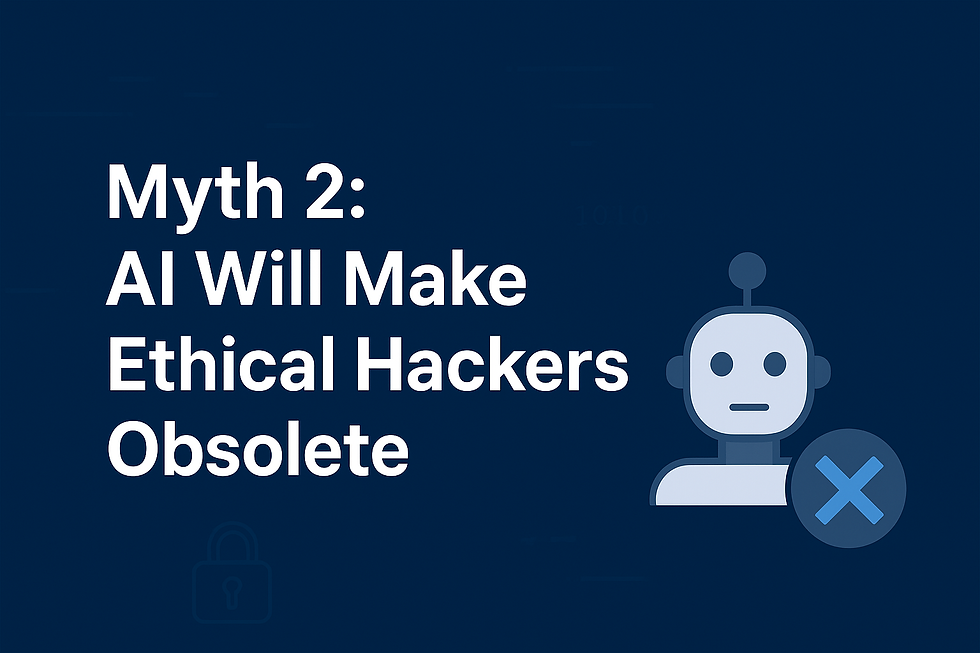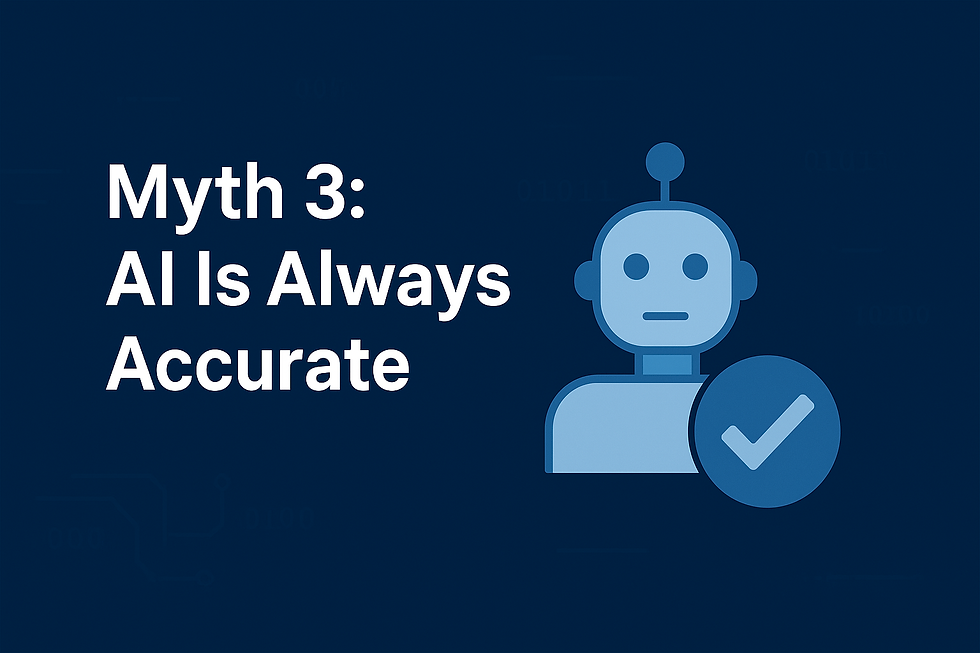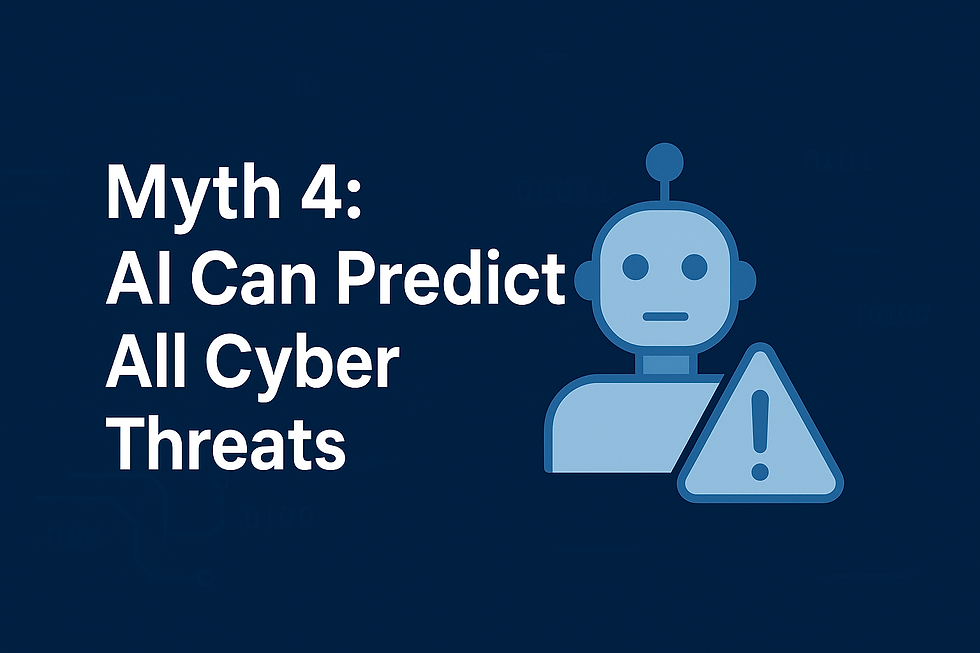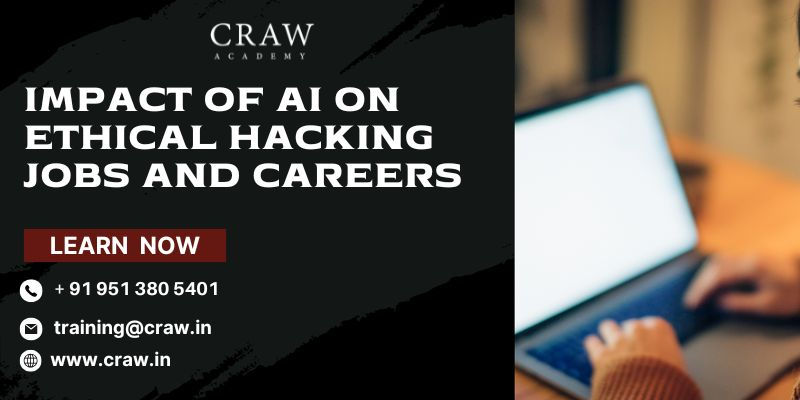Can AI Replace Ethical Hackers: Myths vs Reality?
- Manisha Chaudhary
- Aug 20, 2025
- 4 min read

Introduction: Can AI Replace Ethical Hackers: Myths vs Reality?
The rise of Artificial Intelligence (AI) in cybersecurity has sparked debates about whether it can completely replace ethical hackers. AI-powered tools can automate vulnerability scans, detect anomalies, and even simulate attacks faster than humans. But the real question is — Can AI Replace Ethical Hackers: Myths vs Reality? Let’s break down the myths and the reality with real-world examples.
Myth 1: AI Can Perform All Ethical Hacking Tasks

Reality:AI excels at repetitive, data-heavy tasks like vulnerability scanning and log analysis. However, ethical hacking involves creative problem-solving — something AI struggles with.
For Example:In 2021, an AI-based penetration testing tool was deployed in a financial company to find vulnerabilities. It detected known issues but missed a business logic flaw in the payment gateway — something a human hacker discovered later by thinking outside the algorithm’s scope.
Myth 2: AI Will Make Ethical Hackers Obsolete

Reality:Instead of replacing hackers, AI changes their role. Ethical hackers now focus on strategic attacks, red teaming, and AI system validation while letting AI handle the heavy scanning work.
Example:Microsoft uses AI in its Security Copilot system for rapid threat detection, but still relies on human cybersecurity teams to interpret results and decide the best defense strategy.
Myth 3: AI Is Always Accurate

Reality:AI can generate false positives and false negatives. Without human oversight, it might miss critical threats or over-report harmless anomalies.
Example:In 2023, an AI-based intrusion detection system flagged a spike in network traffic as a DDoS attack. Upon human review, it turned out to be a legitimate cloud backup operation. The human intervention prevented unnecessary downtime.
Myth 4: AI Can Predict All Cyber Threats

Reality:AI predicts threats based on past data. But cybercriminals constantly invent zero-day attacks that AI models haven’t seen before. Humans excel at anticipating unpredictable scenarios.
Example:The 2017 WannaCry ransomware exploited a zero-day vulnerability. AI models at the time failed to identify it in early stages, but human researchers spotted patterns and released emergency patches.
Myth 5: AI Works Without Human Assistance

Reality:AI requires constant training, fine-tuning, and threat intelligence updates. Without ethical hackers feeding it new data and validating its outputs, AI becomes outdated.
Example:Cylance, an AI-powered antivirus, initially performed well but later saw detection rates drop when cybercriminals developed new evasion techniques. Human researchers had to retrain the models with updated malware samples.
Impact of AI on Ethical Hacking Jobs and Careers

Skill Shift:
Ethical hackers must learn AI-based tools, data analysis, and machine learning fundamentals.
Higher Efficiency:
AI handles large-scale scanning, allowing ethical hackers to focus on complex exploits.
Increased Demand:
With rising cyber threats, the need for AI-aware ethical hackers is growing.
New Roles:
Jobs like AI Threat Analyst and AI Security Engineer are emerging.
Example:
Companies now prefer ethical hackers who can operate tools like AI-driven intrusion detection systems alongside manual penetration testing.

Frequently Asked Questions (FAQs)
Q. Can AI completely replace ethical hackers?
No. AI can automate many cybersecurity tasks, but ethical hacking requires creativity, intuition, and adaptability — qualities AI currently lacks.
Q. What role does AI play in ethical hacking?
AI helps in vulnerability scanning, threat detection, anomaly identification, and automated testing, allowing ethical hackers to focus on complex attack simulations.
Q. Why can’t AI detect all types of cyber threats?
AI relies on past data for predictions, so it may miss zero-day vulnerabilities or novel attack methods that haven’t been previously recorded.
Q. How do ethical hackers work with AI?
Ethical hackers use AI-powered tools for speed and scale, then analyze and validate results, making strategic decisions based on their expertise.
Q. Are AI-driven cybersecurity tools 100% accurate?
No. AI can produce false positives and false negatives, so human review is essential to ensure accuracy and avoid unnecessary disruptions.
Q. Will AI reduce the demand for ethical hackers?
A: AI will change the skill requirements, but demand for ethical hackers will remain high, especially for advanced penetration testing and security strategy.
Q. What are the limitations of AI in cybersecurity?
A: Limitations include lack of creativity, inability to anticipate entirely new threats, reliance on quality training data, and vulnerability to adversarial attacks.
Q. Can AI be hacked itself?
A: Yes. AI models can be manipulated through adversarial attacks or poisoned training data, which is why ethical hackers are needed to secure AI systems.
Q. How does AI improve ethical hacking efficiency?
AI speeds up tasks like log analysis, network scanning, and vulnerability prioritization, reducing manual effort and allowing faster incident response.
Q. What is the future of AI and ethical hacking?
The future will see AI-human collaboration — AI handling large-scale data analysis while ethical hackers focus on creative and strategic threat mitigation.
Conclusion
AI is transforming ethical hacking by automating repetitive tasks, analyzing massive datasets, and detecting threats faster. However, it cannot replace human creativity, critical thinking, and adaptability.The future of cybersecurity is collaboration between AI and human ethical hackers — where AI handles scale, and humans handle strategy. WhatsApp now for more information




Comments